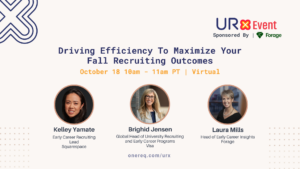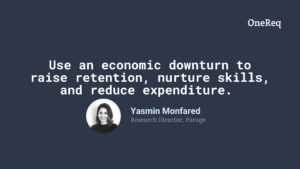BY: Yasmin Monfared
Entering the world of work is daunting – particularly for students.
With only a short window to explore and prepare for their career paths while they study, early talent would be stranded without guidance from educators and employers. But is everyone on the same page?
In late 2021, Forage conducted a global study across nearly 10,000 participants, consisting of a quantitative survey and in-depth interviews across students, educators, and employers, to better understand how aligned the early talent community is on what it takes for early talent to successfully pursue a career.
1 in 3 students do not know what they need to do to successfully pursue a career.
Forage learned that college students lack the confidence and career awareness to pursue the roles of their dreams. They:
- Don’t know what to trust or where to begin. Over 70% feel they lack opportunities to gain relevant industry experience.
- Have an inconsistent experience, accessing career advice through uncoordinated and unvetted means. Self-guided online searches were the primary means of accessing information for nearly 80% of those surveyed.
- Rely on educators for career advice – despite faculty and staff frequently lacking the relevant industry expertise or connections.
“It’s so difficult to understand what the roles are like — when they say ‘we are hiring
analysts’ — what does that actually mean?”
— Finance Graduate (U.S.)
This uncertainty across early talent creates four areas of misalignment:
Timing
Employers and educators recommend that early talent take steps to become employable from their first year at college. Students, however, only consider taking those steps midway through college — and they become increasingly unclear on what they should be doing as they progress through their education.
Over 40% took steps to enhance employability after the recommended time period from employers and educators.
Engagement
While employers highlight the importance of extracurricular activities for showcasing consistent interest in a particular industry or role, students believe their limited time is better spent pursuing relevant industry experience.
When asked to identify the top three most important factors to make their application
stand out, only 13% included extracurriculars.
Intent
In a world of one-click applications, both our interviews with employers and students resounded with the desire for a human approach to the recruiting experience. But their preferred markers of authentic intent are misaligned.
Nearly 50% of our study participants identified connecting with recruiters as one of their biggest challenges
Nearly 20% of students apply to over 40 jobs and use ‘hot words’ to bypass ATS systems – believing they have to play a numbers game when it comes to applications.
Skills
Skills play a complex role in early talent success. Employers value candidates who can illustrate how their general skills translate to the workplace — but without access to those workplaces, students struggle to know what employers want, and instead agonize over gaining job-specific technical skills.
Only 14% of students believe college provides the skills necessary for workplace
success.
But early talent also feels trapped by the perception that there’s a catch-22: to gain experience that provides essential skills, you frequently need experience.
“They train you when you are hired — but not having certain skills is a disadvantage
when applying for a job. It is so frustrating when I see a job requiring a certain skill set,
but I never learned those skills and so am disadvantaged when applying.
— Chemistry Student (U.S.)
Solving the disconnect
Employers, as the gatekeepers of the workforce, are uniquely positioned to solve this misalignment and create an environment that empowers the next generation of talent. Based on the findings, the Great Disconnect report recommends:
1. Create your source of truth
Creating an instructive, comprehensive, and accessible source of truth that lets candidates know with specificity what they should be doing — and when.
Open-access and online frameworks enable employers to do this, while opening their doors and demystifying what it takes to successfully secure a role. This single source of truth also ensures consistency with what third parties communicate on behalf of employers.
2. Create open-access opportunities
Creating open-access opportunities for students to develop technical skills through preskilling: a scalable and unburdensome solution that solves the opportunity catch-22 for students eager to gain industry experience. Virtual job simulations prime early talent to contribute faster, and enable them to gain career awareness, improving organizational efficiency and business outcomes.
3. Create positive friction
Creating opportunities to align on engagement and intent through positive friction, a method used by large global employers incorporating a mutually beneficial ‘hurdle’ in the application process that candidates overcome to demonstrate engagement and intent amid the sea of one-click applications.
Not only a notable marker of authentic intent to the employer, positive friction enables early talent to build real, transferable skills – regardless of their application outcome.
Download the full report including more findings here.
About the Author
Yasmin Monfared is Forage’s Research Director. She is responsible for leading and collating research and insights across Forage’s student, educator, and employer community to help recruiters enhance and evolve their talent strategies.
About Forage
With Forage’s virtual job simulations, students can build the skills and confidence they need for career success – before they apply for the role. Each program replicates work at a top company and helps students develop the tools necessary to thrive at that organization.To learn more about Forage click here.




